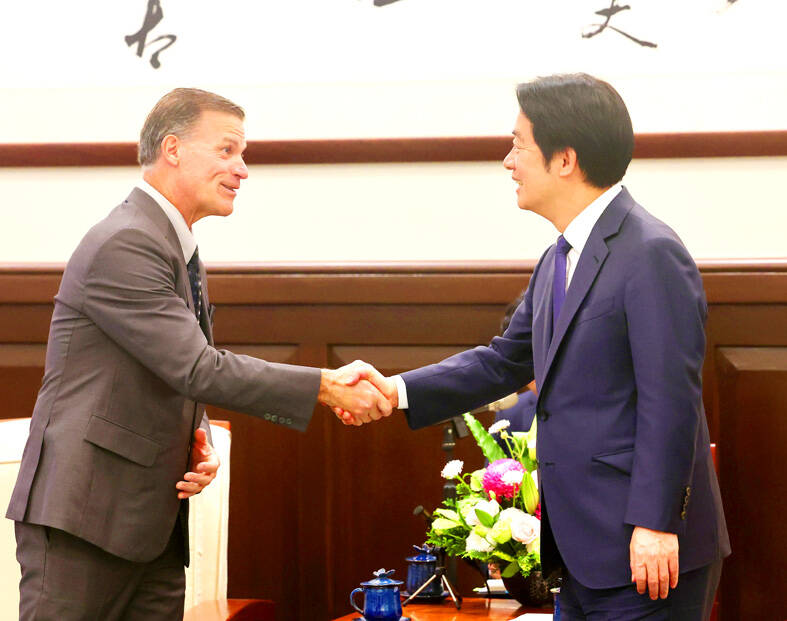Taiwan’s flourishing democracy is crucial to regional peace and stability, former US Navy admiral John Aquilino said during a meeting with President William Lai (賴清德) in Taipei yesterday.
Aquilino, who was head of the Indo-Pacific Command, made the comments at an event at the Presidential Office attended by a delegation from the National Bureau of Asian Research think tank.
Aquilino said he continues to be incredibly impressed with Lai’s leadership and the “actions he has taken to secure Taiwan and defend its people.”

Photo: CNA
The pace of efforts to foster whole-of-society defense is “nothing short of inspiring,” he said.
Taiwan’s thriving democracy is “incredibly important” to the peace and stability of the region, he added.
Aquilino vowed to continue offering support alongside the think tank.
National Bureau of Asian Research president Michael Wills and his team are an asset to Taiwan and the US in helping continue their close relationship, and to ensure peace and stability in the region, he said.
Lai offered his “deepest gratitude” to the think tank for its research on regional security, which he said has allowed the international community to gain a better understanding of Taiwan’s role in the Indo-Pacific region and global democratic development.
Taiwan is continuing to implement its “four pillars of peace” action plan — enhancing national defense capabilities, building economic security, demonstrating stable and principled cross-strait leadership, and standing with the democratic community to establish deterrence — and stands at the forefront of global democracy at a strategically important position in the first island chain, Lai said.
Other efforts to ensure Taiwan’s safety include increased military allowances for volunteer service members and combat troops at the beginning of the month, reforming national defense and enhancing self-sufficiency, Lai added.
“We will prioritize special budget allocations to ensure that Taiwan’s defense budget exceeds 3 percent of GDP,” he said.
“These efforts continue to strengthen Taiwan’s self-defense capabilities and demonstrate our commitment to defending freedom and democracy,” he added.
Lai thanked the US government for its arms sales to Taiwan and for expanding the Taiwan-US partnership.
In addition to engaging in military exchanges and cooperation, the two nations could also more tightly integrate their economic and trade relationship to boost each other’s economic resilience, he said.

The manufacture of the remaining 28 M1A2T Abrams tanks Taiwan purchased from the US has recently been completed, and they are expected to be delivered within the next one to two months, a source said yesterday. The Ministry of National Defense is arranging cargo ships to transport the tanks to Taiwan as soon as possible, said the source, who is familiar with the matter. The estimated arrival time ranges from late this month to early next month, the source said. The 28 Abrams tanks make up the third and final batch of a total of 108 tanks, valued at about NT$40.5 billion

Two Taiwanese prosecutors were questioned by Chinese security personnel at their hotel during a trip to China’s Henan Province this month, the Mainland Affairs Council (MAC) said yesterday. The officers had personal information on the prosecutors, including “when they were assigned to their posts, their work locations and job titles,” MAC Deputy Minister and spokesman Liang Wen-chieh (梁文傑) said. On top of asking about their agencies and positions, the officers also questioned the prosecutors about the Cross-Strait Joint Crime-Fighting and Judicial Mutual Assistance Agreement, a pact that serves as the framework for Taiwan-China cooperation on combating crime and providing judicial assistance, Liang

A group from the Taiwanese Designers in Australia association yesterday represented Taiwan at the Midsumma Pride March in Melbourne. The march, held in the St. Kilda suburb, is the city’s largest LGBTQIA+ parade and the flagship event of the annual Midsumma Festival. It attracted more than 45,000 spectators who supported the 400 groups and 10,000 marchers that participated this year, the association said. Taiwanese Designers said they organized a team to march for Taiwan this year, joining politicians, government agencies, professionals and community organizations in showing support for LGBTQIA+ people and diverse communities. As the first country in Asia to legalize same-sex

MOTIVES QUESTIONED The PLA considers Xi’s policies toward Taiwan to be driven by personal considerations rather than military assessment, the Epoch Times reports Chinese President Xi Jinping’s (習近平) latest purge of the Chinese People’s Liberation Army (PLA) leadership might have been prompted by the military’s opposition to plans of invading Taiwan, the Epoch Times said. The Chinese military opposes waging war against Taiwan by a large consensus, putting it at odds with Xi’s vision, the Falun Gong-affiliated daily said in a report on Thursday, citing anonymous sources with insight into the PLA’s inner workings. The opposition is not the opinion of a few generals, but a widely shared view among the PLA cadre, the Epoch Times cited them as saying. “Chinese forces know full well that